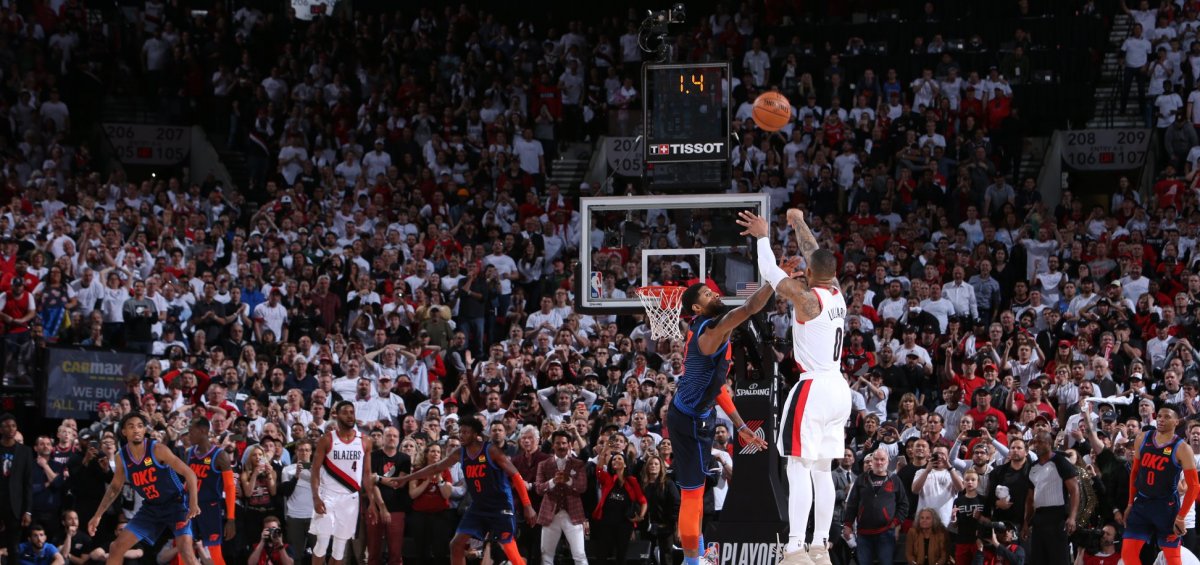Portland has been overflowing with excitement since Tuesday over Damian Lillard’s historical playoff game in which he led the Trail Blazers to victory over Russell Westbrook and the Oklahoma City Thunder. With mere seconds left in a tied game, “Logo Lillard” hit a three from over 30 feet from the basket. While OKC’s Paul George may think it was a fluke, or in his words “a bad shot,” those of us who have been paying attention know Lillard has been practicing that exact shot every chance he can. As the famous saying goes, “luck happens when opportunity meets preparation.” Damian Lillard has been preparing himself and his team for this moment – and it paid off.
Here are five leadership lessons you can take away from Lillard’s game:
Understand Your Tendencies
The Blazers team and coaching staff discussed the tendencies of their opponents in order to craft an effective strategy, allowing them to slow the progress of their opponent. It is important for leaders to understand their own tendencies and avoid behaviors that are counterproductive to the success they are looking to accomplish.
Trust Your Team
With approximately three minutes to go in the game, Lillard was gesturing to his backcourt teammate that he wanted the ball at that critical juncture in the game after being down 15 points with seven minutes remaining. After being smothered by the defense, you could see Lillard acquiesce and allow his teammate to take over. Well, it turns out that it was a great decision as his teammate CJ McCollum nailed a jump shot from the top of the key to tie the game. Trusting your team is an essential component of successful leadership. In an era of bravado and egoism, the ability to acknowledge the gifts and talents of key team members is crucial.
Maintain Your Focus in Difficult Situations
The Blazers and their coaches never panicked in spite of the challenge they faced while it appeared that the momentum had shifted in favor of the Thunder. Taking the approach that you need one defensive stop and one basket allowed the rhythmic strategy to take full effectiveness. As a leader, it is important to never lose sight of the strategy you crafted that led you to success, and while minor adjustments may be necessary, it’s best not to totally abandon what has worked for you in the midst of your challenge. Having the confidence and savvy to know what to do and how to maintain your composure is key to remaining focused. A winning methodology stands the test of time especially when you have planned for good times and difficult times.
A Winning Strategy Has Safeguards Against Failure
The fact is that Lillard’s late-game heroics included a safety net should not be overlooked. His shot from 37 feet, as he faded away another foot, had a level of difficulty which is foreign to many of us. However, the Blazers created a late-game situation which is referred to in the basketball as a “Win or Tie” scenario. The worst-case scenario was a tie which would lead to overtime, and the momentum had clearly shifted to the Blazers. As a leader, you should always look for opportunities to structure any scenario with minimal risk, ideally zero risk when available. When you have properly developed a strong command of your work and the most effective ways to accomplish a goal you can then properly create winning strategies that mitigate risk.
Remember to Say Thank You
As the horn sounded and the celebration of the Blazers victory ensued, you could see an exuberant Damian Lillard walking around the Moda Center dispensing high-fives, handshakes, and hugs to those who stood in admiration of what was truly a spectacular performance. He was ingratiating himself to the fans and supporters of his efforts, creating lasting memories for all involved. In essence, he was cementing his position as leader of the franchise. Leaders find ways to align their successes with those who participate in the overall success. They often deflect attention from themselves, but also know when it is appropriate to establish trust and seize buy-in from all involved. Remember to always acknowledge that you are not alone in your success and others play a pivotal role in accomplishing any goal.
It is important for leaders to learn from everyday occurrences in order to stimulate opportunities for growth. Not all examples are derived for academic approaches. Leadership is often more art than it is science and life provides the best canvas for leaders to create their own winning picture.







